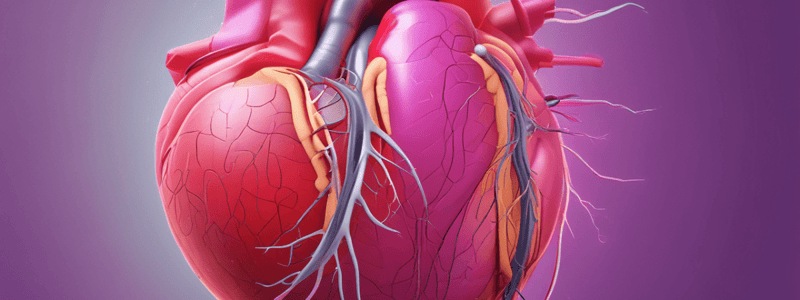Podcast
Questions and Answers
What is the mainstay of treatment for patients with Bradyarrhythmia or tachyarrhythmias?
What is the mainstay of treatment for patients with Bradyarrhythmia or tachyarrhythmias?
- Ventricular assist devices
- Surgical removal
- Genetic testing
- Implanted pacemakers (correct)
Which of the following is a type of Cardiomyopathy?
Which of the following is a type of Cardiomyopathy?
- Myocarditis (correct)
- Pericardiocentesis
- Infective Endocarditis
- Constrictive Pericarditis
What is the main goal of treatment for Cardiomyopathy?
What is the main goal of treatment for Cardiomyopathy?
- Electrical Alterations correction
- Symptom relief (correct)
- Heart transplant
- Defibrillators implantation
Which part of the heart is primarily affected by Constrictive Pericarditis?
Which part of the heart is primarily affected by Constrictive Pericarditis?
What is a common diagnostic approach for Infective Endocarditis?
What is a common diagnostic approach for Infective Endocarditis?
When might a patient eventually require a heart transplant as part of their treatment?
When might a patient eventually require a heart transplant as part of their treatment?
What is the main characteristic of constrictive pericarditis?
What is the main characteristic of constrictive pericarditis?
Which condition presents with LV dysfunction during the last trimester of pregnancy or shortly after delivery?
Which condition presents with LV dysfunction during the last trimester of pregnancy or shortly after delivery?
What is the main etiology proposed for stress cardiomyopathy?
What is the main etiology proposed for stress cardiomyopathy?
Which heart condition mainly affects diastolic function and can lead to sudden cardiac death in young individuals?
Which heart condition mainly affects diastolic function and can lead to sudden cardiac death in young individuals?
What is a common characteristic of dilated cardiomyopathy?
What is a common characteristic of dilated cardiomyopathy?
Which condition is characterized by a distorted valve leading to backward flow when it should be closed?
Which condition is characterized by a distorted valve leading to backward flow when it should be closed?
What is the primary treatment for pericardial tamponade?
What is the primary treatment for pericardial tamponade?
Which of the following is a cause of constrictive pericarditis?
Which of the following is a cause of constrictive pericarditis?
Which of the following is a characteristic finding in infective endocarditis?
Which of the following is a characteristic finding in infective endocarditis?
Which of the following microorganisms is commonly associated with infective endocarditis?
Which of the following microorganisms is commonly associated with infective endocarditis?
What is the Kussmaul sign associated with constrictive pericarditis?
What is the Kussmaul sign associated with constrictive pericarditis?
Flashcards are hidden until you start studying
Study Notes
Cardiomyopathy
- Cardiomyopathy is a disease of the heart muscle, leading to structural and functional changes.
- 50% of occurrences are due to genetic mutations, linked to over 100 genes.
- Three main groups of cardiomyopathy: dilated, hypertrophic, and restrictive.
Dilated Cardiomyopathy (DCM)
- Develops when ventricles become enlarged, leading to systolic dysfunction.
- Noncardiac causes include genetic and systemic abnormalities, increased age, familial history, and other factors.
- Presents with symptoms such as dyspnea, palpitations, and edema.
Peripartum Cardiomyopathy
- Occurs during the last trimester of pregnancy or the first 5 to 6 months after delivery.
- Presents with left ventricular dysfunction, such as dyspnea, palpitations, and edema.
- Criteria for diagnosis include heart failure, no identifiable cause of heart failure, and evidence of systolic dysfunction.
Stress Cardiomyopathy (Takotsubo Cardiomyopathy)
- Reversible left ventricular dysfunction in response to profound psychological or emotional stress.
- Affects women, who present with angina and no evidence of CAD in Cath.
- Impaired myocardial contractility, with unclear etiology.
Hypertrophic Cardiomyopathy (HCM)
- Mainly affects diastolic function, with hypertrophied ventricular wall.
- Sudden cardiac death in young people, especially in teens or younger adults.
- Cardiac arrhythmias occur due to enlarged ventricular wall or septum muscle blocking the outflow into the aorta.
Restrictive Cardiomyopathy
- Rare in the U.S., presents with symptoms such as dyspnea, fatigue, and ascites.
- Treatment includes pericardiocentesis, pericardiectomy, and surgical removal or ablation.
Electrical Alterations
- Due to impulse formation and/or conduction problems, leading to bradyarrhythmia or tachyarrhythmias.
- Diagnosis and treatment involve history, physical exam, and EKG, with pharmacology as the mainstay of treatment.
Valve Disorders
- Mitral valve disorders: stenosis, regurgitation, and prolapse.
- Aortic valve disorders: stenosis and regurgitation.
- Presents with symptoms such as systolic murmur, and a mid-systolic CLICK.
Constrictive Pericarditis
- Calcified scar tissue develops between the visceral and parietal layers of the serous pericardium.
- Decreased preload and affects the cardiac output.
- Causes include mediastinal radiation, cardiac surgery, and infection.
- Manifestations include ascites, pedal edema, dyspnea on exertion, and fatigue.
Infective Endocarditis
- Invasion of the heart valves and endocardium by a microbial agent.
- Formation of bulky, friable vegetations and destruction of underlying cardiac tissues.
- Common causes include Staphylococcus, Streptococci, Enterococci, and Haemophilus sp.
Studying That Suits You
Use AI to generate personalized quizzes and flashcards to suit your learning preferences.



